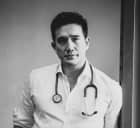Webinar
Sport Injuries & ACL Tears
Ask Dr Alan Cheung about:
- Who should you see for a sports injury in Singapore
- Who is a good candidate for an ACL surgery
- How fast can you recover after ACL surgery
- Reason why an ACL surgery might fail
- How fast can you recover after ACL surgery
Dr Alan Cheung was born in England and was educated in Cambridge. He is a Consultant Orthopaedic Surgeon in Singapore specialising in Sports Injuries and Adult Reconstruction. He also performs Robotic Surgery, and manages General Adult and Paediatric Trauma, and Musculoskeletal Tumours.
Questions 7
How safe is total knee replacement surgery?
Thanks for the question which I think is a good one. Often patients who ask this question are answered with a barrage of statistics and percentages which is confusing. As someone whose mother recently underwent a total knee replacement (TKR) I understand that what patients are really looking for in a surgeon when they ask this question, is someone who can do the best surgery possible, communicate and empathise well, and will care for their family member as if they were their own, which is something I strive for.
Can a meniscus tear heal on its own? How is a meniscus tear treated?
The answer is to these questions is – it depends on the location of the tear, type and size of tear, and whether there are degenerative changes in your knee also. The meniscus is a C shaped disc of fibrocartilage. The blood supply comes from the (periphery) outside of the meniscus – the so called ‘red zone’. Towards the centre of the meniscus (the ‘white’ zone) the blood supply is poor. There are two menisci in the knee – one on the inside of the knee (medial) and one on the outside (lateral).
How can a frequent runner with knee pain heal his knee?
I see many seniors who wish to remain active and enjoy running. Unfortunately many in this age group have degenerative change and osteoarthritis in their knees and other joints. This is often due to several factors like a previous injury, genetics, and mechanical wear and tear over time. I often explain to my patients that their knees are like the moving parts of a car engine. Over time the parts may wear out, particularly if they are used for heavy activities such as long distance running.
What should I do for anterior ankle impingement affecting my running?
Anterior Ankle Impingement is a condition where a patient has pain at the front of the ankle, due to compression of the bony or soft tissue structures during activities which involve deep ankle bending (maximal dorsiflexion). Simple measures to reduce pain include avoiding walking or running on uneven ground, nonsteroidal anti-inflammatory drugs if tolerated, and ankle bracing. I would strongly recommend that you see a good physiotherapist.
What are the treatment options for an ACL tear?
The anterior cruciate ligament (ACL) provides stability to prevent the shin bone (tibia) sliding forwards and rotating in relation to the thigh bone (femur). Patients with a complete ACL tear may find that they are unable to play sports where they need to turn, sidestep or pivot rapidly e. g. soccer, basketball, because their knee keeps ‘giving way’. Everyone reacts differently to an ACL injury, and your friend may not have had exactly the same injury, activity level and symptoms that you have.
What is the cause and treatment for knee cap pain?
Pain at the front of the knee is often due to problems from the kneecap (i. e. patellofemoral joint). This can be due to a number of causes. In young females, the most common causes are: Patellofemoral pain syndrome Chondromalacia patella 1. Patellofemoral Pain Syndrome Patellofemoral pain syndrome occurs when nerves sense pain and inflammation in the soft tissues and bone around the kneecap. In some cases it can be caused by a sudden change in physical activity, improper sports technique or Changes in footwear or playing surface.
Which doctor should I see for joint hypermobility, chronic joint pain and instability?
Hello, sorry to hear about your problems. Hypermobile joints have a range of movement which exceeds the normal range, usually due to laxity of the surrounding ligaments. This determined by the content of various proteins such as collagen and elastin. Rarely there may be an underlying genetic disorder such as Ehlers Danlos syndrome or Marfan’s syndrome. These conditions may be associated with blood vessel problems – if you have concerns it may be worth seeing a geneticist in Singapore for screening. Hypermobility may be beneficial for certain sports e. g.
